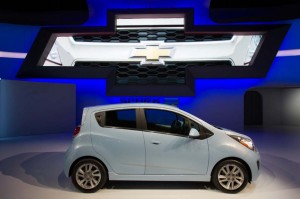Mega-supplier Johnson Controls has withdrawn its bid for the bankrupt battery maker A123 Systems after declining to match a higher, $256.6 million bid submitted by the Chinese company Wanxiang Group Corp.
JCI originally appeared to have landed a deal to take control of the automotive portion of A123 – but the deal was scuttled in bankruptcy proceedings – though it leaves open some national security concerns. Meanwhile, Illinois-based Navitas Systems will buy A123’s government business, including all outstanding military contracts, for $2.25 million.
A123 currently is the principal supplier of batteries for Fisker, which has seen its deliveries interrupted since the company filed for bankruptcy in October. The battery maker’s other clients include General Motors which will use an A123 pack in its new Chevrolet Spark EV electric vehicle.
The final sale to Wanxiang, which has been something of an uncertain suitor until now, is subject to approval by the bankruptcy court. A hearing is currently scheduled for Dec. 11, 2012. Sale to Wanxiang is also subject to review by the Committee for Foreign Investment in the United States and requires approval by the U.S. government. Timing for such review and approvals is unknown at this time.
But there are some concerns being raised about the deal, U.S. Representative Bill Huizenga, a Michigan Republican, cautioning there is a “thin line between Wanxiang and the Chinese government.” As a result, he said in a statement, “I am concerned about the government of China having access to sensitive technologies being used by our military forces.”
By splitting the sale, with military and government operations going to Navitas, however, A123 officials say they hope to assuage such concerns.
“While A123’s automotive and government assets were complementary to Johnson Controls’ portfolio and aligned with our long-term goals, Wanxiang’s offer was beyond the value of those assets to Johnson Controls,” said Alex Molinaroli, president, Johnson Controls Power Solutions.
“Reports by other parties that our proposal involved an elimination of jobs in Michigan are inaccurate,” Molinaroli added.
Johnson Controls was the first in the world to produce lithium-ion batteries for mass-production vehicles, and also launched the first U.S. facility to produce complete LIon battery cells and packs for hybrid and electric vehicles, in Holland, Mich. The company was recently named as one of the industry leaders in the Joint Center for Energy Storage Research’s $120 million energy research hub led by Argonne National Lab and funded by the U.S. Department of Energy.
In 2009, Johnson Controls was awarded a $299 million matching grant by the DOE under the American Recovery and Reinvestment Act to build domestic manufacturing capacity for advanced batteries for hybrid and electric vehicles.
A123, meanwhile, was a finalist in the bidding process for GM’s Chevrolet plug-in hybrid, and had lined up a series of other projects after losing that contract to South Korea’s SG Chem. But the slow start-up of the battery-car market short-circuited A123’s business plan despite the injection of a federal loan.
Last month, A123 got approval to use $50 million of Debtor-in-Possession financing from Wanxiang. The financing supplements the pre-petition $22.5 million of liquidity and letter of credit support that Wanxiang provided to A123.
“We are pleased that the Court has granted A123 interim approval for the DIP financing agreement,” Dave Vieau, Chief Executive Officer of A123, said.”The DIP financing will allow A123 to operate our businesses and provides additional operational and financial stability as we proceed with the transaction process.”

